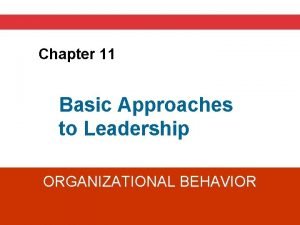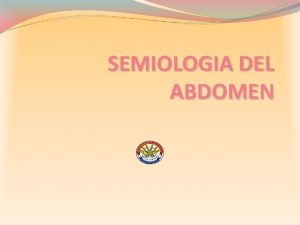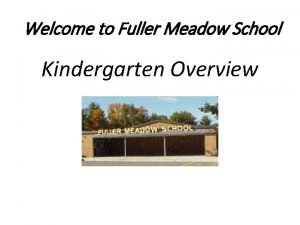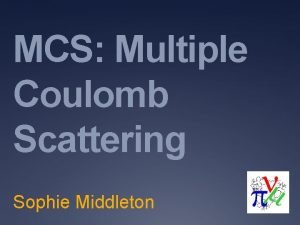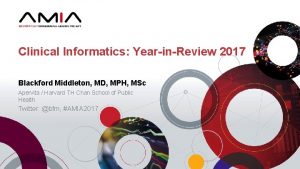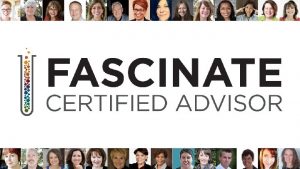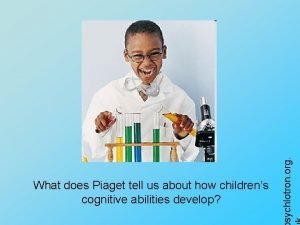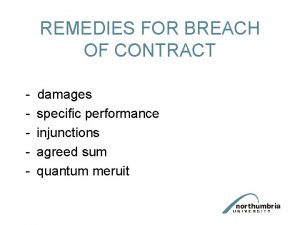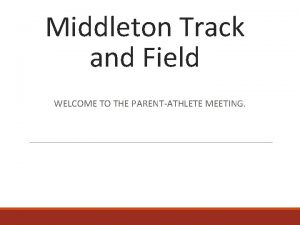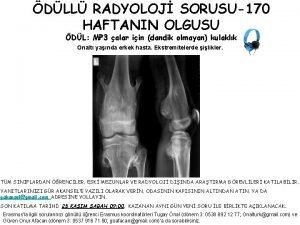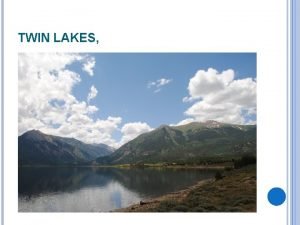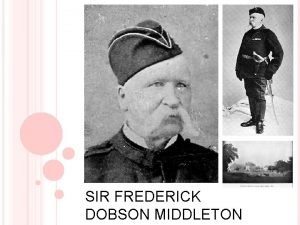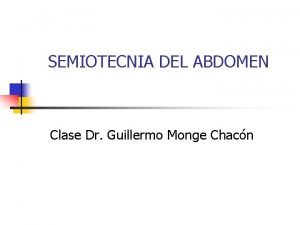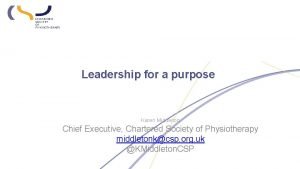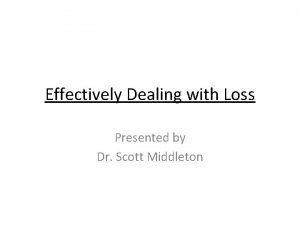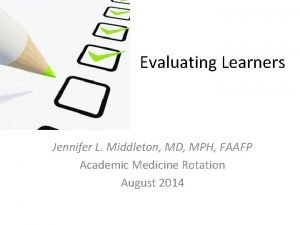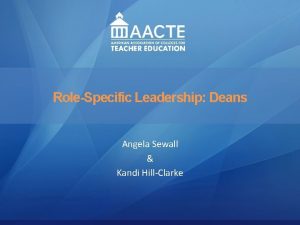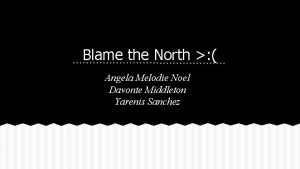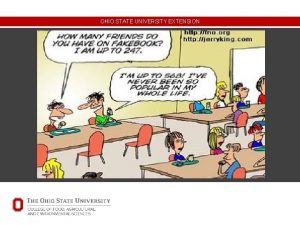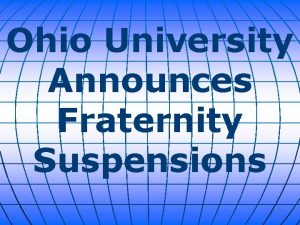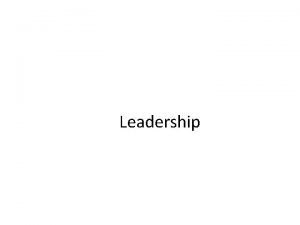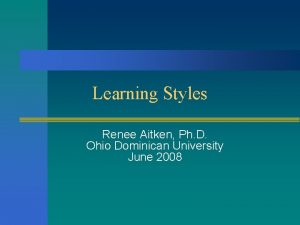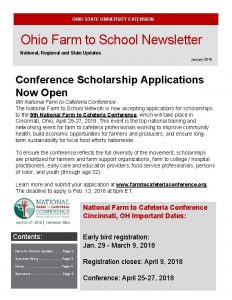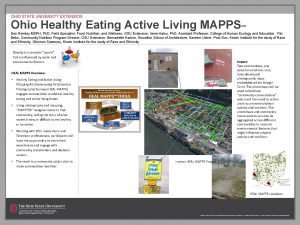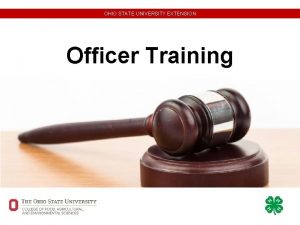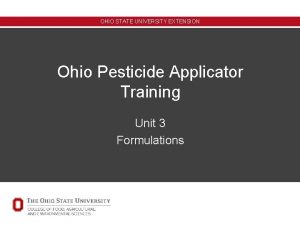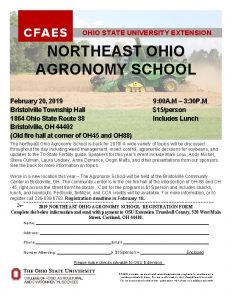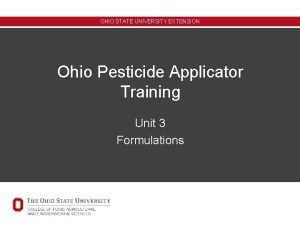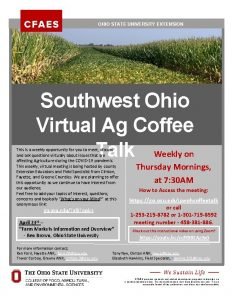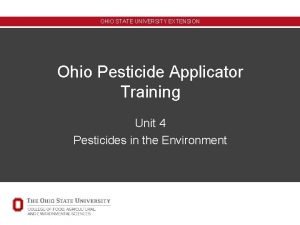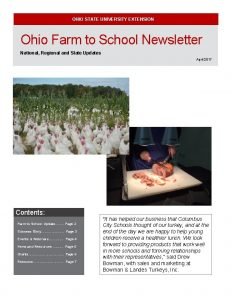Renee A Middleton Ohio University Leadership Angela M





















- Slides: 21

• Renee A. Middleton, Ohio University Leadership • Angela M. Sewall, UALR AACTE Leadership Academy

Leadership and Team Building Session Objectives 1). Learn how to strategically lead through: v. Building your community; v. Setting direction; and v. Empowering others. 2). Develop strategies for effectively leading your academic team through: Shared leadership v. Team goals v. Constructive conflict v. Consensus decision making v. Supportive climate v Faculty and staff development American Association of Colleges for Teacher Education

The Call for Academic Leaders q Without leadership training q Without executive experience q Without understanding of ambiguity conflict q Without recognition of metamorphic changes q Without awareness of the cost to scholarship q Without leadership succession planning American Association of Colleges for Teacher Education

What is Academic Leadership? “Academic leadership is the act of building a community of colleagues to set direction and achieve common purposes through the empowerment of faculty and staff. ”

Key Conditions of Effective Academic Leadership • Building a community of colleagues • Setting direction • Empowering others American Association of Colleges for Teacher Education

Developing Leadership Expertise Ø As a faculty member, it takes on average 6 years to associate and 14 years to full professor. q As a dean or department chair, how long does it take to become an expert? q 10, 000 -hour rule q 10 -year rule q 4 day seminar rule? Ø As an academic leader, how do you equip yourself for success? Walt. Gmelch, Center for Academic Leadership, University of San Francisco 6 American Association of Colleges for Teacher Education

Conceptual Understanding ed nd u o Gr heory T Application Academic Leadership Development Skill Development Pra ctic e Reflective Practice Walt Gmelch, Center for Academic Leadership, University of San Francisco 7

Double Agent Conditions for Department/College Renewal • Foster Teamwork • Purposeful Leadership • Focus on Teaching • Commitment to Quality Source: Pew Policy Perspectives 8 American Association of Colleges for Teacher Education

Leadership—Building your Team • Who is on your team? • What do you need from each of those team members? • How will you begin to build the team? • How do you motivate this team? • Who, when and how are decisions made? • What decisions do you make? Others make? What do you decide collectively? American Association of Colleges for Teacher Education

United Wineries TEAM ASSIGNMENT: PURCHASE LANDS FOR GRAPE CULTURE LAND SHOULD HAVE: q Adequate rainfall q Fertile soil q Gentle slope q Adequate sub-soil drainage IF DEFICIENT, COMPENSATE BY: q Irrigation q Fertilizers q Terracing q Draining (These are expensive, so you can only correct one deficient condition) ü Findings of agriculture experts are not complete so there will be some information missing on some of the available plots. YOUR TASK: To discover and purchase as many suitable plots of land as possible without purchasing those that are not suitable.

What are key ingredients of an effectively functioning academic team? American Association of Colleges for Teacher Education

Effective Academic Teams • Leadership • Participation • Decision • Conflict • Goals • Climate • Individual Development American Association of Colleges for Teacher Education

Keys to a Productive Department/School Decision Making Constructive Conflict Leadership Professional Development Goals Walter H. Gmelch, Center for the Study of Academic Leadership, University of San Francisco American Association of Colleges for Teacher Education

A Leader Is Best When people barely know that he exists, Not so good when people obey and him or her, Worst when they despise him or But of a good leader, who talks When his or her work is done, his aim fulfilled, They will all say, “We did this ourselves. ” Lao Tzu – 2500 years ago or she acclaim her. little, or her American Association of Colleges for Teacher Education

The Academic Team An academic team is a manageable number of colleagues with multiple perspectives, complementary skills, and compatible group processes who are committed to a common purpose and hold themselves mutually accountable for its results. (What does this mean in your department/college? ) (Adapted from Katzenbach and Smith, The Wisdom of Teams, p. 45) American Association of Colleges for Teacher Education

Effective Team Characteristics Collective Team Attitude • • Goals • • • Management • • Decision Making • • • Conflict • • • Professional Development • • Traditional Department Climate Long term, future-oriented goals Established & Modified to give the best possible match between individual goals & department goals Commitment sought from all members of the department • • • Short-term, changing, operational goals Little consideration given to individual or personal Imposed upon the group by the chair A shared responsibility All faculty members feel responsible for contributing to the department goals Different members, because of their knowledge or abilities, act as “resource expert” at different times , thus the management roles change as the tasks of the department change • • Delegated by position Position determines influence Obedience to authority the accepted norm Power concentrated in authority positions Information openly shared with all staff and faculty Decisions reached by consensus All members usually in agreement with final results or outcomes, after all interested parties have been heard and understood Disagreements usually constructive to each common understanding and improve conceptual acceptance • • • Information restricted or unavailable Decisions made by authority Those in opposition expected to “go along” even though in actual practice they often remain resentful Conflict and controversy viewed as positive and essential to the problem-solving process Disagreements may be frequent and candid but relatively comfortable Little evidence of personal attack; criticism is constructive and even supportive in nature Interests of all parties explored with collaborative search for common solution • Conflict viewed as a destructive barrier to problem solving and is consciously ignored or suppressed Disagreements may be suppressed by the chair or “resolved” by a majority vote, which leaves a still unconvinced minority Criticism embarrassing and tension producing often leading to accommodation or compromise Emphasis on department position with little attention to the interests of conflicting parties Time and effort directed toward developing strong interpersonal relationships and building individual problem-solving skills Self-actualization encouraged for each individual team member through achievement of department performance goals Recognition based on individual contribution to department successes through informal feedback • • • Emphasis on conformance to “organizational standards” and on group productivity Rewards and discipline tied to department productivity goals, with little attention to interpersonal relationships to individual skill development From W. H. Gmelch & V. D. Miskin (2011). Department Chair Leadership Skills: Madison, WI: Atwood Publishing, pg. 32;

Portrait of an Effective Department • A supportive climate • Frequent Interaction • Toleration (champion) of differences • Generational equity • Workload equity • Balanced incentives • Effective leaders Stanford Institute for Higher Education Research American Association of Colleges for Teacher Education

Leadership—Building your team • • Who are you developing as leaders? What kind of succession planning is there? How do you regenerate energy and enthusiasm? How will you get the really honest feedback that you need as a leader? American Association of Colleges for Teacher Education

“We’re all in this alone” -Lily Tomlin

Legacy Worksheet How do you want to be remembered as an academic leader?

Old Buddhist Saying To know and not to use, is not yet to know. American Association of Colleges for Teacher Education
 Ohio leadership studies
Ohio leadership studies Palpación monomanual
Palpación monomanual Facts about princess kate
Facts about princess kate Fuller meadow middleton ma
Fuller meadow middleton ma Sophie middleton
Sophie middleton Dr. blackford middleton
Dr. blackford middleton Carmen heijligers
Carmen heijligers Wood and middleton (1975)
Wood and middleton (1975) Diesen v samson
Diesen v samson Middleton high school track and field
Middleton high school track and field Kate middleton
Kate middleton Space of traube
Space of traube Frederick dobson middleton
Frederick dobson middleton Maniobra de obrastzow
Maniobra de obrastzow Karen middleton csp
Karen middleton csp Dr scott middleton
Dr scott middleton Frederick dobson middleton
Frederick dobson middleton Jennifer middleton md
Jennifer middleton md Gina middleton
Gina middleton Jessica renee johnson photo
Jessica renee johnson photo Les pomes
Les pomes Renee grassi
Renee grassi
